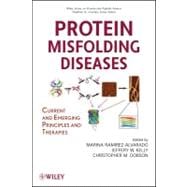
Note: Supplemental materials are not guaranteed with Rental or Used book purchases.
Purchase Benefits
Looking to rent a book? Rent Protein Misfolding Diseases Current and Emerging Principles and Therapies [ISBN: 9780471799283] for the semester, quarter, and short term or search our site for other textbooks by Ramirez-Alvarado, Marina; Kelly, Jeffery W.; Dobson, Christopher M.. Renting a textbook can save you up to 90% from the cost of buying.
| Contributors | p. xi |
| Foreword | p. xix |
| Preface | p. xxv |
| Acknowledgments | p. xxvii |
| Introduction to the Wiley Series on Protein and Peptide Science | p. xxix |
| Principles of Protein Misfolding | |
| Why Proteins Misfold | p. 3 |
| Endoplasmic Reticulum Stress and Oxidative Stress: Mechanisms and Link to Disease | p. 21 |
| Role of Molecular Chaperones in Protein Folding | p. 47 |
| Kinetic Models for Protein Misfolding and Association | p. 73 |
| Toxicity in Amyloid Diseases | p. 93 |
| Autophagy: An Alternative Degradation Mechanism for Misfolded Proteins | p. 113 |
| Role of Posttranslational Modifications in Amyloid Formation | p. 131 |
| Unraveling Molecular Mechanisms and Structures of Self-Perpetuating Prions | p. 145 |
| Caenorhabditis elegans as a Model System to Study the Biology of Protein Aggregation and Toxicity | p. 175 |
| Using Drosophila to Reveal Insight into Protein Misfolding Diseases | p. 191 |
| Animal Models to Study the Biology of Amyloid-ß Protein Misfolding in Alzheimer Disease | p. 213 |
| Protein Misfolding Disease: Gain-of-Function and Loss-of-Function Diseases | |
| Alzheimer Disease: Protein Misfolding, Model Systems, and Experimental Therapeutics | p. 233 |
| Prion Disease Therapy: Trials and Tribulations | p. 259 |
| Misfolding and Aggregation in Huntington Disease and Other Expanded Polyglutamine Repeat Diseases | p. 305 |
| Systemic Amyloidoses | p. 325 |
| Hemodialysis-Related Amyloidosis | p. 347 |
| Copper-Zinc Superoxide Dismutase, its Copper Chaperone, and Familial Amyotrophic Lateral Sclerosis | p. 381 |
| Alpha-1-Antitrypsin Deficiency | p. 403 |
| Folding Biology of Cystic Fibrosis: A Consortium-based Approach to Disease | p. 425 |
| Thiopurine S-Methyltransferase Pharmacogenomics: Protein Misfolding, Aggregation, and Degradation | p. 453 |
| Gaucher Disease | p. 469 |
| Cataract as a Protein-Aggregation Disease | p. 487 |
| Islet Amyloid Polypeptide | p. 517 |
| Role of Accessory Molecules and Risk Factors | |
| Role of Metals in Alzheimer Disease | p. 545 |
| Why Study the Role of Heparan Sulfate in In Vivo Amyloidogenesis? | p. 559 |
| Serum Amyloid P Component | p. 571 |
| Role of Oxidatively Stressed Lipids in Amyloid Formation and Toxicity | p. 585 |
| Role of Oxidative Stress in Protein Misfolding and/or Amyloid Formation | p. 615 |
| Aging and Aggregation-Mediated Proteotoxicity | p. 631 |
| Medical Aspects of Disease: Diagnosis and Current Therapies | |
| Imaging of Misfolded Proteins | p. 647 |
| Diagnosis of Systemic Amyloid Diseases | p. 673 |
| Identification of Biomarkers for Diagnosis of Amyloid Diseases: Quantitative Free Light-Chain Assays | p. 689 |
| Real-Time Observation of Amyloid-ß Fibril Growth by Total Internal Reflection Fluorescence Microscopy | p. 699 |
| Current and Future Therapies for Alzheimer Disease | p. 711 |
| Current Therapies for Light-Chain Amyloidosis | p. 775 |
| Familial and Senile Amyloidosis Caused by Transthyretin | p. 795 |
| Identifying Targets in ¿-Synuclein Metabolism to Treat Parkinson Disease and Related Disorders | p. 817 |
| Emerging Molecular Targets in the Therapy of Dialysis-Related Amyloidosis | p. 843 |
| Familial Amyloidosis Caused by Lysozyme | p. 867 |
| Therapeutic Prospects for Polyglutamine Disease | p. 887 |
| Approaches for New and Emerging Therapies | |
| Chemistry and Biology of Amyloid Inhibition | p. 905 |
| Immunotherapy in Secondary and Light-Chain Amyloidosis | p. 917 |
| Anti-Misfolding and Anti-Fibrillization Therapies for Protein Misfolding Disorders | p. 933 |
| Therapies Aimed at Controlling Gene Expression, Including Up-Regulating a Chaperone or Down-Regulating an Amyloidogenic Protein | p. 945 |
| Understanding and Ameliorating the TTR Amyloidoses | p. 967 |
| Index | p. 1005 |
| Table of Contents provided by Ingram. All Rights Reserved. |
The New copy of this book will include any supplemental materials advertised. Please check the title of the book to determine if it should include any access cards, study guides, lab manuals, CDs, etc.
The Used, Rental and eBook copies of this book are not guaranteed to include any supplemental materials. Typically, only the book itself is included. This is true even if the title states it includes any access cards, study guides, lab manuals, CDs, etc.